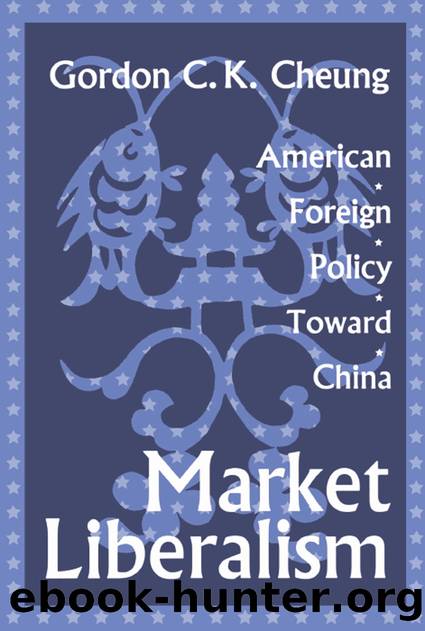Market Liberalism: American Foreign Policy Toward China by Gordon Cheung

Author:Gordon Cheung [Cheung, Gordon]
Language: eng
Format: epub
Tags: International Relations, Public Policy, Political Ideologies, Political Science, Conservatism & Liberalism, General
ISBN: 9781351290265
Google: uziDDwAAQBAJ
Goodreads: 4869996
Publisher: Routledge
Published: 1998-04-28T00:00:00+00:00
Between the Lines from Congressional Hearings
As long as the âhigh politicsâ played in Vietnam were in its highest stage, the âlow politicsâ of trade and economic activities were also in full swing. The period from 1962 to 1967 was called the Kennedy Round in the GATT negotiation of international trade and tariff reduction. By the end of this round in May 1967, the average reduction of tariffs reached a record 35 percent.15 Immediately after the conclusion of the Kennedy Round, the Subcommittee on Foreign Economic Policy organized a hearing on âThe Future of U.S. Foreign Trade Policyâ in July 1967. The purpose of this hearing was described as follows:
to examine the past, not to find errors, but to take stock and learn our lessons well;
to try to foresee the changes that are imminent and to direct our efforts accordingly;
to persuade the United States to dispense with policies that are anachronistic, or which cater to outmoded demands, and to reinforce our efforts to achieve significant and necessary advances in the international commerce of nations, and of the United States in particular;
to deal plainly with the special interests of our own country in agriculture and industry, while always remembering the primary importance of the general public interest;
to give our negotiators the basis for firm and flexible bargaining with our trading partners in other countries and through agencies such as GATT; and finally,
to keep constantly in mind the interdependence of the trading world and the need to maintain its growth and prosperity, which represents for us all the best protection.16
Those points presented in the above quotation and many other similar arguments expressed in the hearing demonstrated that the United States should be courageous in opening a new horizon in the area of trade. Such a move not only arrested the tide of the decrease of the United Statesâ unilateral power but also generated an environment governed by the facilitation of the norms of the international economy. The reasons were not only for the benefit of U.S. interests but also for the consideration of the global market economy. Actually, George W. Ball, the former under secretary of state, had bluntly commented that:
the problem we encounter again and again in our trading relations with the Iron Curtain, or for that matter, even with Red China, is that our producers are denied the opportunity of making perfectly good sales of their products in the belief that we are hurting the Iron countries by denying them something, when the fact is that they can get these same products elsewhere, and do get them elsewhere. All we are doing is an act of self-flagellation that doesnât advance the American interest.17
To be more explicit, he continued by putting forward his idea that even China and the United States could cooperate, even during the height of cold war, in the way of underpinning market forces. He mentions that wheat, as a commodity, can be a starting point in building a market incentive of exchange between the United States and China:
Now, I would say the same thing with regard to Red China, but with a qualification.
Download
This site does not store any files on its server. We only index and link to content provided by other sites. Please contact the content providers to delete copyright contents if any and email us, we'll remove relevant links or contents immediately.
| Anthropology | Archaeology |
| Philosophy | Politics & Government |
| Social Sciences | Sociology |
| Women's Studies |
The Secret History by Donna Tartt(19085)
The Social Justice Warrior Handbook by Lisa De Pasquale(12190)
Thirteen Reasons Why by Jay Asher(8909)
This Is How You Lose Her by Junot Diaz(6885)
Weapons of Math Destruction by Cathy O'Neil(6279)
Zero to One by Peter Thiel(5801)
Beartown by Fredrik Backman(5751)
The Myth of the Strong Leader by Archie Brown(5507)
The Fire Next Time by James Baldwin(5442)
How Democracies Die by Steven Levitsky & Daniel Ziblatt(5218)
Promise Me, Dad by Joe Biden(5153)
Stone's Rules by Roger Stone(5087)
A Higher Loyalty: Truth, Lies, and Leadership by James Comey(4960)
100 Deadly Skills by Clint Emerson(4924)
Rise and Kill First by Ronen Bergman(4788)
Secrecy World by Jake Bernstein(4752)
The David Icke Guide to the Global Conspiracy (and how to end it) by David Icke(4717)
The Farm by Tom Rob Smith(4507)
The Doomsday Machine by Daniel Ellsberg(4490)
